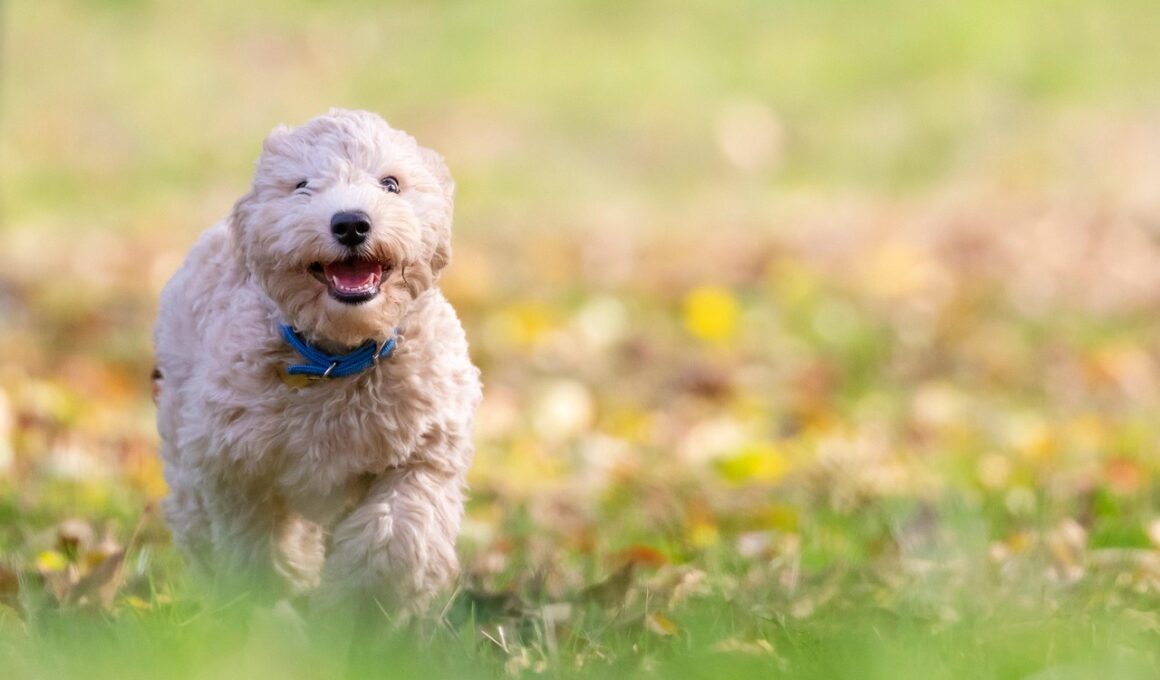Incorporating Puzzle Toys to Challenge Your Dog’s Brain
Dogs are intelligent creatures that require mental stimulation just as much as physical exercise. One effective way to provide mental enrichment is through puzzle toys. These interactive toys come in various designs and difficulty levels, encouraging dogs to think critically and engage with their environment. Furthermore, puzzle toys significantly reduce boredom. A bored dog may engage in destructive behavior, such as chewing furniture or barking excessively. Keeping your dog mentally occupied can mitigate these issues. Puzzle toys also promote problem-solving abilities, allowing dogs to learn new skills while having fun. For instance, many toys dispense treats when completed correctly. This positive reinforcement keeps dogs motivated and eager to solve more puzzles. Choosing the right puzzle toy depends on your dog’s personality and preferences. It’s essential to consider factors such as size, learning curve, and interest level. Introducing these toys gradually can also help your dog adapt and enjoy them fully. Overall, incorporating puzzle toys into your dog’s routine is a proactive way to enhance their cognitive abilities and make playtime more engaging.
Puzzle toys can vary significantly in complexity, which allows dog owners to select the best fit for their pet’s abilities. For eager learners, starting with easier puzzles ensures that they experience success early on. Gradually increasing the challenge keeps them engaged without causing frustration. Many dogs thrive on the challenge and excitement of working for rewards. Additionally, introducing various types of toys can prevent monotony and keep your dog interested. Puzzle toys can range from simple treat-dispensing balls to complex electronic devices that require multiple steps to unlock rewards. The focus should be on enjoyment and mental stimulation rather than just achieving success. Regularly rotating the types of puzzle toys your dog has access to will maintain their interest and enthusiasm. Incorporating these toys during playtime or as a part of your dog’s daily routine can foster more consistent engagement. It’s also beneficial for dogs to work on puzzles independently as this builds confidence and self-reliance. As your dog masters some toys, they can be challenged with new ones, providing endless opportunities for learning and fun.
Emotional Benefits of Puzzle Toys
In addition to providing mental stimulation, puzzle toys can also foster emotional well-being in dogs. Dogs that are mentally engaged often display more balanced behavior and emotional resilience. Bored dogs may show signs of stress or anxiety, which can be alleviated through mental challenges. Engaging dogs in puzzle solving can create a positive outlet for their energy, reducing typical behavioral problems. This increased focus often translates into improved confidence, as dogs learn to navigate challenges successfully. Furthermore, puzzle toys serve as an excellent bonding activity for dog owners and their pets. Participating together in puzzle play can enhance the relationship and communication between dog and owner. Dogs enjoy working alongside their humans, and through this shared experience, they can form stronger emotional connections. Owners can feel more in tune with their dog’s needs and preferences, making adjustments to puzzles or activities as necessary. This fosters a deeper understanding and respect for each other, enriching the human-animal bond. Overall, the emotional benefits that come with puzzle toys can significantly enhance the quality of life for dogs.
When selecting puzzle toys, it’s essential to consider safety and durability. Toys made from high-quality materials will not only last longer but also ensure that they are safe for your dog. Avoid toys with small parts that may present choking hazards. Checking for any toxic materials is crucial to keep your dog healthy and safe. Each time you provide a puzzle toy, it’s advisable to supervise play, especially with new toys. Monitoring ensures that your dog engages with the toy safely and effectively. It’s also a great opportunity to observe how they interact with different types of puzzles. Some dogs might prefer toys that dispense treats complicatedly, while others might do better with simple snuffle mats. Understanding your dog’s preferences allows for a tailored enrichment experience that keeps their interest. Maintenance is another consideration when choosing puzzle toys. Look for toys that are easy to clean, as hygiene is vital for your dog’s overall health. Regularly inspect toys for wear and tear, replacing them when necessary to avoid sharp edges or broken parts that could harm your pet.
DIY Options for Puzzle Toys
If purchasing toys isn’t feasible, creating DIY puzzle toys can be an economical and effective way to challenge your dog’s brain. Many everyday items can be repurposed into engaging toys that encourage exploration and problem-solving. For example, placing treats inside a cardboard box and sealing it with tape can create a fun surprise for your dog. A muffin tin, often found in kitchens, can also be transformed into a dog puzzle by placing treats under tennis balls in the tin’s cups. This DIY method provides mental stimulation without a significant financial investment. Additionally, using items like empty plastic bottles or fabric scraps can add to the collection of puzzle toys. Dogs enjoy the challenge of figuring out how to access treats hidden within the toys. When using recyclable materials, ensure they are safe and do not pose a choking hazard. Involving your dog in the creation process can also be rewarding. Talk them through it, and watch as they eagerly anticipate the fun that awaits them, building excitement for the new toy.
Engaging dogs with puzzle toys also offers opportunities for social interaction. When dogs are challenged mentally, they may be more open to playing in a group setting. This enhanced focus can lead to healthier canine socialization, as dogs learn to share toys and engage with other dogs in a playdate environment. Incorporating puzzle toys into pet playgroups can help facilitate interaction and maintain excitement among the dogs involved. Moreover, a well-adjusted dog is often more likely to thrive in social situations. They can learn to share toys and even collaborate with their canine friends on problem-solving. This aspect of social engagement is vital for their overall development. As dogs learn to interact with toys and other dogs positively, their self-control and impulse management improve. The key is to encourage sharing and avoid possessiveness, promoting healthier interactions. Additionally, exploring new social contexts through puzzle toy play can help develop your dog’s confidence in unfamiliar situations. This experience not only enriches their lives but also strengthens the bonds between dogs and their humans.
Final Thoughts on Puzzle Toys
Incorporating puzzle toys into your dog’s daily routine is an invaluable decision. Not only do they provide crucial mental stimulation, but they also foster emotional and social well-being. The challenge presented by these toys can alleviate stress, reduce behavioral problems, and enhance the bond between dogs and their owners. A wide variety of commercial and DIY options makes it easy for any pet owner to find engaging puzzles. Tailoring these toys to fit your dog’s individual personality and preference should be the priority. As dogs solve these puzzles, they experience a satisfying sense of achievement that boosts their confidence. With consistent use, puzzle toys can play a massive role in overall enrichment, resulting in a happier and healthier pet. Together, problem-solving and fun enhance dogs’ lives while creating opportunities for bonding. Finally, always remember to provide supervision, ensure safety, and regularly rotate the toys to keep your dog interested. By making mental enrichment a regular part of your dog’s life, you not only challenge their mind but also work toward a fulfilling, well-balanced lifestyle for your furry friend.
In summary, puzzle toys serve as effective tools for enriching your dog’s mental landscape. They stimulate cognitive processes, enhance emotional connections, and provide bonding opportunities between owners and pets. Implementing these toys regularly helps regulate behavior, reduce stress, and promote happy, well-rounded dogs.


